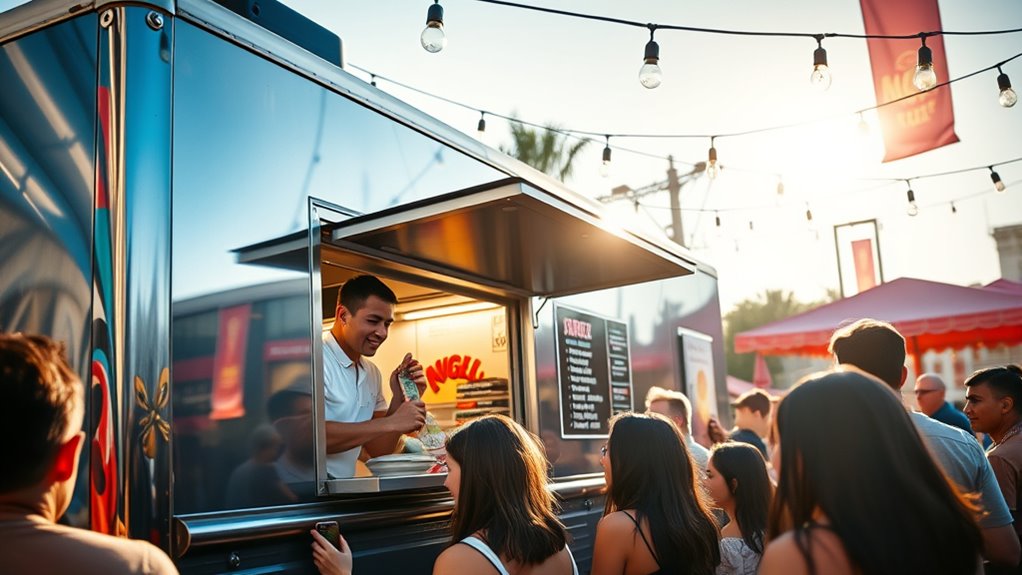To assess food truck franchising opportunities, you should evaluate the market demand, competition, and location strategies. Look into the franchisor’s reputation, support programs, and training to guarantee ongoing assistance. Consider your investment costs and how franchise guidelines impact menu and vehicle maintenance. Analyze success stories and performance data, along with your personal skills and business goals. Keep an eye on long-term growth potential, and if you explore further, you’ll uncover essential insights for making informed decisions.
Key Takeaways
- Evaluate franchisor support, training, and ongoing assistance to ensure strong operational guidance.
- Analyze franchise costs, fees, and legal agreements for financial feasibility and compliance.
- Assess location strategies, market demand, and demographic fit to maximize customer reach.
- Review brand reputation, marketing support, and success stories to gauge growth potential.
- Consider design scalability, menu flexibility, and expansion plans for long-term business development.
Understanding the Food Truck Market Dynamics
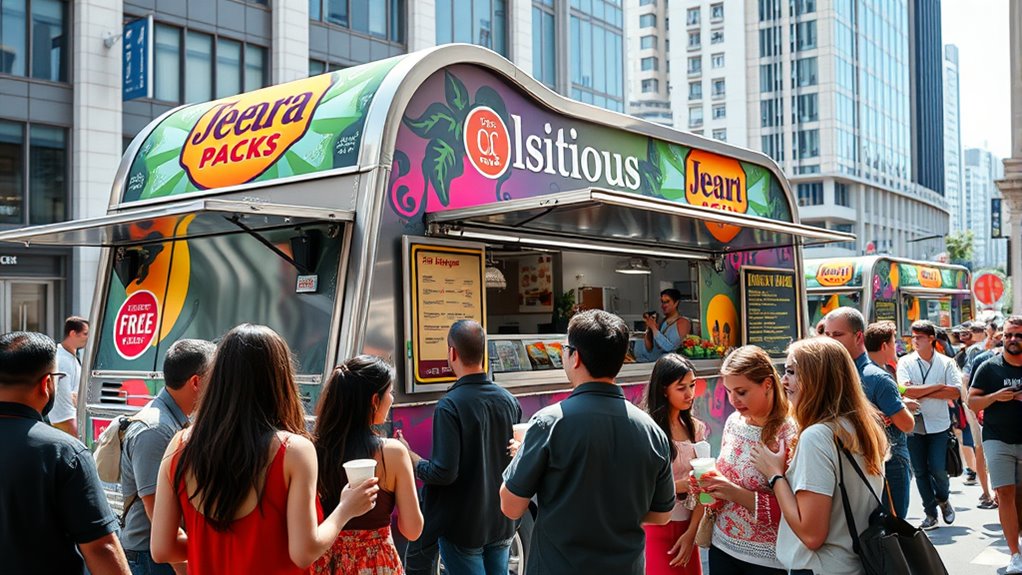
Understanding the food truck market dynamics is essential if you’re considering entering this industry. To succeed, you need to grasp how mobile food regulations impact operations, including licensing, health codes, and parking restrictions. These regulations vary by city and can influence your daily schedule and location choices. Additionally, food truck maintenance plays a critical role in maintaining smooth operations; regular upkeep ensures safety, hygiene, and vehicle reliability. Staying updated on local rules helps you avoid fines or shutdowns, while well-maintained equipment keeps your menu running seamlessly. Recognizing how these factors interplay allows you to plan effectively, adapt to market trends, and position your food truck for long-term success. Properly managing your regulatory compliance is crucial for sustained operation and growth in the competitive food truck industry. Moreover, understanding vehicle technology can help you optimize performance and reduce long-term costs, ensuring your business remains competitive. Being aware of specialized vehicle maintenance requirements, especially for customized or unique trucks, can further enhance longevity and operational efficiency. Additionally, understanding the impact of regulations on your ability to choose optimal locations can significantly influence your business’s profitability.
Evaluating Brand Recognition and Reputation

When considering a food truck franchise, evaluating the brand’s recognition and reputation is crucial, as they directly influence customer trust and loyalty. A well-known brand quickly attracts customers and encourages repeat visits, boosting your chances of success. Look into how the brand is perceived locally and nationally—positive reviews, media coverage, and community presence matter. Strong brand loyalty means customers will choose your truck over competitors, even in crowded markets. Trust in the brand’s reputation reassures customers about quality and consistency, which are essential for long-term growth. If the brand has a solid reputation for good food and reliable service, you’ll find it easier to build a loyal customer base. Establishing a trusted reputation is key to building confidence among your target audience and ensuring ongoing success. Additionally, a recognized brand often provides marketing support and resources that can help you attract more customers early on. Understanding how the brand employs sound design techniques in its marketing materials can also influence customer engagement and brand recall. Building a brand with a strong community presence can further enhance customer loyalty and word-of-mouth promotion. Moreover, analyzing the brand’s history can provide insights into its resilience and adaptability in changing markets.
Analyzing Franchise Support and Training Programs
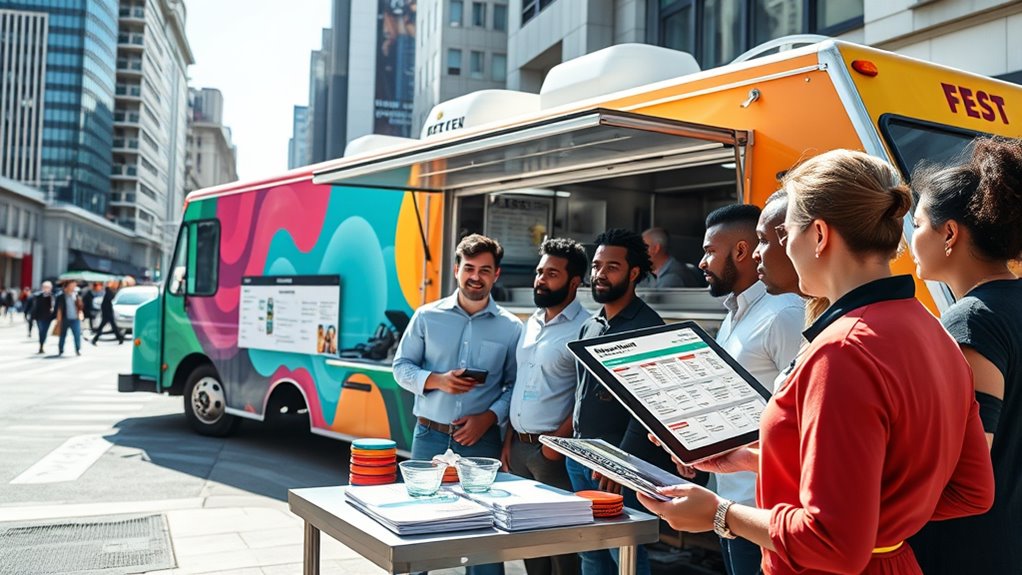
You want to make certain you’re well-prepared, so reviewing the franchise’s training program structure is vital. Look for complete initial training and clear guidelines to help you get started confidently. Additionally, consider the ongoing support they offer to help you grow and address challenges along the way. Being aware of store hours can also be beneficial for planning your operations and ensuring customer satisfaction. Understanding tea preparation techniques can further improve your service quality and customer experience. Incorporating AI-powered virtual reality in e-learning tools can enhance your staff training, making it more effective and engaging. Recognizing the health benefits of juice can also inspire menu options that appeal to health-conscious customers, potentially boosting your franchise’s success. Furthermore, exploring family dynamics within the franchise community can foster stronger relationships and support networks among franchisees.
Training Program Structure
A well-structured training program is essential for guaranteeing franchisees can successfully operate their food trucks from day one. It should cover key areas like developing a cohesive food truck menu, so you understand ingredient sourcing and presentation standards. You’ll also learn vehicle maintenance basics, helping you handle routine upkeep and troubleshoot common issues. Clear instruction on operational procedures ensures consistency across your fleet, maintaining quality and efficiency. Hands-on training sessions build confidence in food prep, customer service, and safety protocols. Additionally, extensive training materials, such as manuals and videos, support ongoing learning. A solid program minimizes mistakes and speeds up your path to profitability, empowering you to manage every aspect of your franchise effectively. Incorporating industry trends into your training ensures your franchise remains competitive and adaptable in a dynamic market. Emphasizing equipment maintenance training helps prevent costly breakdowns and extends the lifespan of your vehicles. Moreover, integrating vibrational alignment techniques can assist franchisees in maintaining high energy and enthusiasm, which positively impacts customer interactions and team morale. Understanding Volkswagen TDI tuning concepts can also inspire innovative approaches to vehicle performance enhancements within your fleet, leading to more reliable and efficient operations. Additionally, providing guidance on online resources can help franchisees stay updated with the latest industry practices and regulations.
Ongoing Franchise Support
Building on a solid training foundation, ongoing franchise support guarantees you stay equipped to adapt and grow. This support includes regular updates, marketing assistance, and operational guidance to ensure your success. It also prepares you for franchise renewal, helping you meet renewal requirements and stay current with brand standards. Good support minimizes the risk of franchise termination by addressing issues early and providing resources to resolve challenges. Consistent communication with franchisors keeps you aligned with evolving goals and market trends. Additionally, integrating email marketing strategies can enhance your outreach efforts and strengthen customer relationships. Regularly reviewing and updating your contact list through list management practices ensures your campaigns remain effective and relevant. Implementing support services like ongoing training and mentorship can further solidify your franchise’s growth trajectory. Ultimately, ongoing support boosts confidence, enhances performance, and sustains your franchise’s longevity. Without it, you risk falling behind or facing termination. Strong support is essential for turning initial training into long-term success and stability in your food truck franchise. Implementing effective support strategies can also improve customer satisfaction and build brand loyalty over time.
Assessing Initial Investment and Ongoing Costs

Evaluating the initial investment and ongoing costs is essential for understanding the financial commitment involved in starting a food truck franchise. You need to conduct a thorough cost estimation to identify all expenses, including truck purchase or lease, equipment, licensing, and initial inventory. An accurate investment analysis helps you determine if the costs align with your budget and projected revenue. Remember, initial costs can vary widely depending on the franchise brand and truck specifications. Ongoing expenses such as maintenance, supplies, fuel, and marketing also impact your profitability. By carefully appraising these costs upfront, you’ll be better prepared to make informed decisions, avoid surprises, and ensure your investment is sustainable over the long term. This strategic approach sets a strong foundation for your franchise success.
Reviewing Franchise Disclosure Documents and Legal Considerations

After estimating your initial and ongoing costs, it’s time to thoroughly review the franchise’s disclosure documents and understand the legal landscape. Carefully examine the franchise agreement to verify it covers essential aspects like menu innovation and how you’ll handle equipment maintenance. Look for restrictions on modifying your menu or introducing new items, as these can impact your ability to adapt to customer preferences. Confirm the franchisor’s support for maintenance schedules and equipment upgrades, which are vital for consistent quality and safety. Pay attention to fees, territorial rights, and renewal terms. Consulting a franchise attorney helps clarify legal obligations and prevent surprises. Being diligent at this stage ensures you’re fully aware of your rights and responsibilities before committing to the franchise opportunity.
Investigating Location Strategies and Market Potential
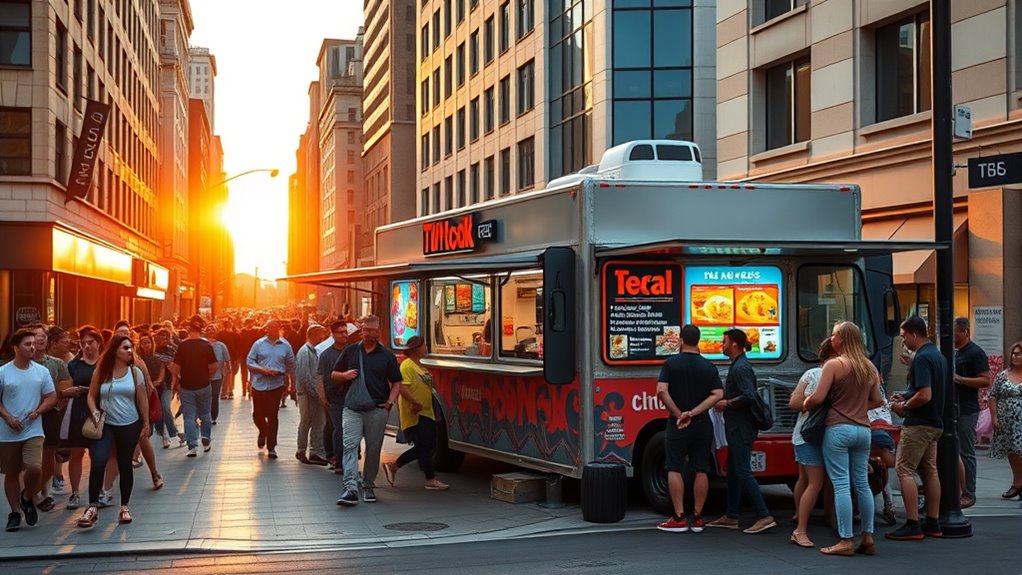
Choosing the right location is vital for your food truck’s success, so focus on ideal placement tactics that attract your target customers. You’ll also want to analyze demographic data to guarantee your offerings meet local preferences and needs. Ultimately, understanding market demand helps you identify the best spots where your food truck can thrive.
Optimal Placement Tactics
To maximize your food truck’s success, you need to focus on strategic placement that taps into high-traffic areas with strong market potential. Consider seasonal trends to identify times when demand peaks, such as summer festivals or winter markets. Geographic diversity is key—by rotating locations, you can reach different customer bases and reduce dependency on a single spot. Scout areas with consistent foot traffic, like business districts, parks, or event venues, and adapt your locations based on current market conditions. Staying flexible allows you to respond to seasonal shifts and local events. Effective placement combines understanding seasonal trends with geographic diversity, ensuring your truck remains visible and accessible year-round, boosting sales and building a loyal customer base.
Demographic Targeting Strategies
Understanding your target demographic is essential for selecting the right locations and maximizing market potential. By analyzing cultural preferences, you can identify areas where your cuisine resonates most strongly. Stay current with culinary trends to guarantee your offerings appeal to evolving tastes. For example, if health-conscious eating is trending, targeting neighborhoods with active lifestyles or wellness communities makes sense. Consider demographic factors such as age, income, and ethnicity, which influence food choices and cultural preferences. This insight helps you pinpoint locations where your food truck will attract loyal customers. Tailoring your strategy around these preferences and trends increases your chances of success and helps you build a strong local presence. Ultimately, demographic targeting guides your decisions and boosts your market potential.
Market Demand Analysis
Analyzing market demand helps pinpoint the best locations for your food truck and assess the potential customer base. Start by researching areas with high foot traffic, such as busy streets, parks, or event venues, to match your food truck menu to local preferences. Consider the types of consumers frequenting these areas and their dining habits. Evaluate the competition nearby to identify underserved markets. Additionally, understanding the logistics of mobile unit maintenance is vital for consistent operation, especially in high-demand zones. By focusing on location strategies that align with your menu and operational capabilities, you can maximize sales and customer satisfaction. Regularly reviewing market trends and customer feedback ensures your food truck remains relevant and profitable in a competitive landscape.
Examining Franchisee Success Stories and Performance Data

Examining franchisee success stories reveals how strategic location choices and effective marketing can lead to impressive sales growth. Successful franchisees often prioritize ideal food truck design, ensuring it attracts customers and complies with health regulations. Performance data highlights key factors:
- Consistent adherence to health regulations, avoiding costly penalties and delays.
- Innovative food truck design that draws attention and enhances customer experience.
- Targeted marketing efforts that boost visibility and foot traffic.
Reviewing these stories helps you identify what works and what doesn’t. Successful franchisees adapt their strategies, focus on compliance, and maximize their food truck’s appeal. By analyzing their performance data, you gain insights into sales trends, operational efficiencies, and customer preferences—crucial elements for your own franchising journey.
Considering Personal Skills and Business Fit

Before diving into franchising opportunities, it’s essential to assess whether your personal skills and strengths match the demands of operating a food truck business. Your success depends on skills like customer service, food preparation, time management, and sales. To evaluate your business fit, consider this table:
| Personal Skills | Business Fit |
|---|---|
| Strong communication | Ability to connect with diverse customers |
| Cooking and food prep | Passion for culinary creativity |
| Multitasking under pressure | Managing operations efficiently |
| Sales and marketing | Promoting the franchise effectively |
Matching your personal skills with business requirements ensures you’re set up for success and enjoyment in franchising. Being honest about your strengths helps identify the right food truck franchise that aligns with your capabilities.
Planning for Long-Term Growth and Expansion
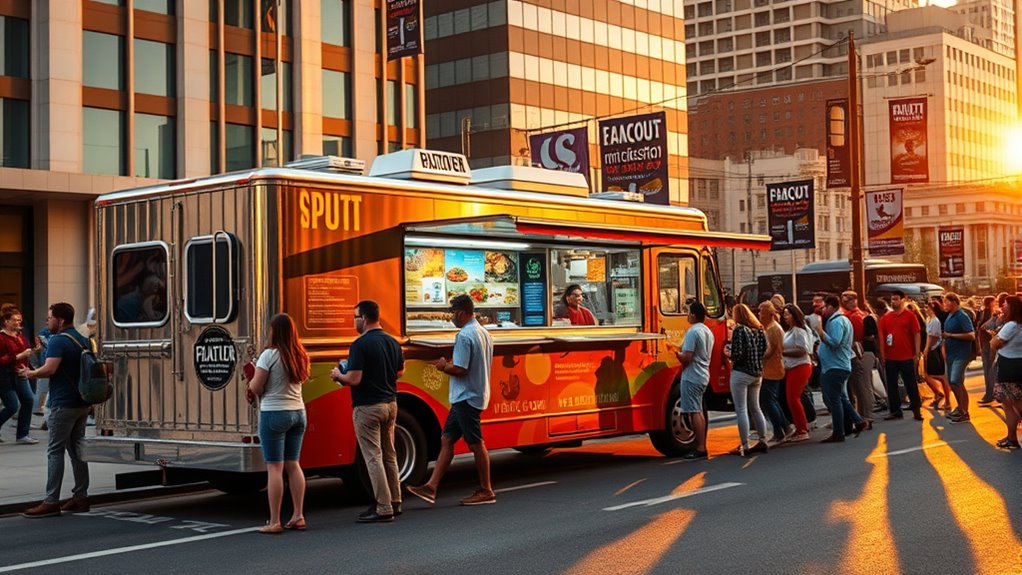
Once you’ve identified a food truck franchise that matches your skills and business goals, it’s time to think beyond the initial setup. Planning for long-term growth involves refining your food truck design and expanding your catering menu. To guarantee steady expansion, consider these key steps:
- Optimize Food Truck Design – Invest in scalable, efficient layouts that can adapt as you grow.
- Diversify Your Catering Menu – Add new offerings to attract broader customers and increase sales.
- Develop a Franchise Model – Create standard operating procedures for replicating your success in multiple locations.
Frequently Asked Questions
What Are Common Challenges Faced by Food Truck Franchisees?
When facing common challenges as a food truck franchisee, you often deal with food truck maintenance to keep your vehicle reliable. Additionally, managing franchise training programs can be demanding, especially when learning new systems or recipes. Balancing operational costs and marketing efforts also proves tricky. Staying on top of these issues helps guarantee your food truck runs smoothly, allowing you to focus on delivering great food and excellent customer service.
How Does Seasonal Demand Affect Profitability?
Imagine your food truck is a boat sailing through changing tides. Seasonal sales cause demand fluctuations, affecting your profitability like high tide boosts earnings and low tide pulls them down. You must navigate these waves carefully, adjusting your strategies to maintain steady cash flow. Recognizing how demand varies with seasons helps you plan better, ensuring you stay afloat even when demand dips, turning fluctuations into opportunities rather than setbacks.
What Legal Permits Are Typically Required for Food Trucks?
When operating a food truck, you need to secure several legal permits. You typically must comply with parking regulations to guarantee you’re parked legally and not blocking traffic. Health inspections are vital, as your truck must meet health and safety standards to serve food. Additionally, you may need a business license and possibly a special permit for mobile food vending. Always check local regulations to avoid fines and ensure smooth operations.
How Flexible Are Franchise Agreements on Menu Customization?
Imagine a menu that’s both a template and a canvas—franchise agreements often balance consistency with creativity. You’ll find menu flexibility varies; some franchises offer extensive customization options, allowing you to adapt dishes to local tastes, while others keep a tight grip on the menu to maintain brand standards. It’s a trade-off between brand uniformity and your ability to innovate, so review franchise policies carefully to find the right fit.
What Marketing Strategies Are Most Effective for Food Truck Franchises?
You should focus on social media to reach local audiences and create buzz around your food truck franchise. Engaging content, promotions, and customer interactions boost visibility. Form local partnerships with nearby businesses or events to expand your reach and attract more customers. Combining these strategies helps you build a loyal customer base, increase brand awareness, and drive sales effectively, making your food truck franchise stand out in a competitive market.
Conclusion
Ultimately, choosing the right food truck franchise requires thorough research and self-assessment. For example, if you prioritize strong brand support, a franchise like Kona Ice might be ideal. Remember, success depends on aligning the opportunity with your skills and market needs. Take your time to analyze the data, learn from existing franchisees, and plan for growth. With careful planning, you can turn your food truck dream into a thriving business.
